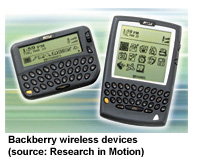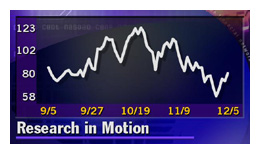|
Blackberry is sweet
|
 |
December 5, 2000: 10:54 a.m. ET
Research in Motion's Blackberry personal assistant device takes off
By Om Malik
|
SAN FRANCISCO (www.redherring.com) - Michael Dell has one, Marc Andreessen does not leave home without it, and it is a must-have accessory for every Wall Street investment banker. It's not the American Express Platinum Card; it's a lowly two-way pager that also sends and receives e-mail.
 The esoterically named Blackberry -- a cross between a personal digital assistant, wireless e-mail device and pager manufactured by Research in Motion (Nasdaq :RIMM) -- is one of the hottest devices in North America, with more than 200,000 sold, mostly to on-the-go corporate types. And those sales have happened primarily through word of mouth, a marketing coup that might be considered the hardware equivalent of Napster's success. The esoterically named Blackberry -- a cross between a personal digital assistant, wireless e-mail device and pager manufactured by Research in Motion (Nasdaq :RIMM) -- is one of the hottest devices in North America, with more than 200,000 sold, mostly to on-the-go corporate types. And those sales have happened primarily through word of mouth, a marketing coup that might be considered the hardware equivalent of Napster's success.
At a recent Churchill Club gathering in Santa Clara, Calif., Kleiner Perkins Caufield & Byers partner John Doerr -- arguably the second-most powerful man in technology, behind Bill Gates -- described the Blackberry as "the I-mode of North America." (I-mode is the popular wireless service from Japan's NTT; with handsets that resemble the smallest American cell phones, I-mode devices are the most common method of accessing the Internet in Japan.)
Doerr was pretty much on the mark. Soon, with America Online (NYSE :AOL) and Yahoo (Nasdaq :YHOO) pushing the consumer version of the device into the market, the Blackberry is likely to become a household name.
Last week, AOL said it will use Research in Motion's hardware and customize it as the AOL Mobile Communicator series of handhelds. AOL subscribers can purchase the device for $329.95 and pay a monthly $19.95 subscription fee to access the wireless service. Given AOL's reach, that could add a few hundred thousand Blackberry devices into the market. PC makers Compaq (NYSE :CPQ) and Dell (Nasdaq :DELL) have signed up to push the device to their customers for a piece of the action.
For Jim Balsillie, chairman and co-CEO of Research in Motion (RIM), these are the salad days. For nearly 12 years, the Waterloo, Ontario-based company has struggled in anonymity, hoping that one day it would become the darling of the Silicon Valley crowd.
His wish has been granted. RIM stock has been on fire for much the year -- rising 44.6 percent, giving the company a market capitalization of about $5.3 billion.
Competition heats up
The Blackberry created a market that everyone else is chasing. Motorola (NYSE :MOT) is hoping for similar success for its new Timeport pagers. But even its neon colors, lower price, and Hollywood push (MTV veejay Carson Daly is a pitchman for the product) may not be enough for Motorola to combat its Canadian rival. Palm (Nasdaq :PALM) and Handspring (Nasdaq :HAND) also are adding such features to their products, but RIM has a nice head start.
Looking to expand quickly, the company has just expanded into Europe. BT, a subsidiary of British Telecommunications, is going to sell the device in England and Europe. All this expansion is, of course, going to take a big bite out of the company's profits.
 While sales are expected to rise to $189.3 million in fiscal 2001 (ending Feb. 28) from $85 million in fiscal 2000, RIM will report a loss of $9.7 million for fiscal 2001 versus $10.1 million in net income in fiscal 2000, according to Merrill Lynch estimates. Merrill analyst William Crawford predicts that by fiscal 2002 RIM will be in the black again, posting a net income of $9.5 million on sales of $344.4 million. While sales are expected to rise to $189.3 million in fiscal 2001 (ending Feb. 28) from $85 million in fiscal 2000, RIM will report a loss of $9.7 million for fiscal 2001 versus $10.1 million in net income in fiscal 2000, according to Merrill Lynch estimates. Merrill analyst William Crawford predicts that by fiscal 2002 RIM will be in the black again, posting a net income of $9.5 million on sales of $344.4 million.
Red Herring recently caught up with Balsillie and talked about the future of RIM and the viral marketing of the Blackberry pager.
Q. Can you explain what makes Blackberry so hot?
A. There are two reasons why Blackberry has become so popular. First of all, it is always on and always connected, so you can get your e-mail anytime, all the time. Secondly, it is an extension of your desktop. Everyone else wants you to have another e-mail address, while Blackberry does not require [it].
Q. Why are you simply focusing on the hardware device and not offering services on top of your platform?
A. Part of our value-add is that we do not contend or compete with the existing player. If it is an Internet service provider (like AOL) or a portal (like Yahoo!) we simply extend their platform. We do one thing -- the hardware -- and we do it very well. I think the embedded antenna, long battery life and ease of use are because of our focus.
Java is key
Q. So what are the new applications currently under development that will give more oomph to the Blackberry?
A. Since we use a Java virtual machine at the core, half a million Java developers can develop applications for Blackberry quite easily. More than 10,000 of our software development kits have been downloaded so far. So you will see people like Aether (Nasdaq :AETH) and ETrade (Nasdaq :EGRP) develop stock-trading applications. Others are developing a personal wallet for the device. Of course, Yahoo! and America Online are offering their own services (such as instant messaging).
Q. Java seems to be the key here.
A. The developers do not know what environment to write for, and they are confused. I think that is why a lot of wireless devices are embracing Java, so that developers can write applications that can run anywhere. We were the first, and now other wireless devices are doing the same.
Q. You must be coming under a lot of competition, especially since Palm and Handspring have started offering their own wireless services and are working with the wireless ISP Omnisky (Nasdaq :OMNY). And they seem to be cheaper.
A. I think the comparison is unfair, because we are a personal information manager, wireless e-mail device, and pager all rolled into one device for $399. Now, if you took the others and added the cost of a modem, their solution is more expensive than us.
Q. What about Motorola, which has new two-way pager-wireless devices on the market that are being touted by Hollywood celebrities?
A. Motorola is selling a pager, a very simple device, that runs on a legacy network and has limited functionality.
Q. What's next for RIM?
A. I think with the America Online and Yahoo! thing, the consumer push is a huge area. Secondly, we are about to start integrating with Lotus Notes. These are two major developments for us, and of course there is the expansion into Europe.
Discuss wireless technologies and trends in the ongoing Wireless discussion forum, or check out forums, video, and events at the Discussions home page.
© 1997-2000 Red Herring Communications. All Rights Reserved. 
|
|
|
|
|
 |

|

